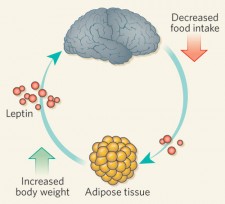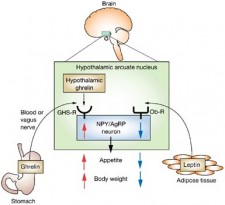Hormones, sleeping patterns and weight
by Dinethri Ramasundara APD AN
Ever thought there was more to over eating?. Diet and exercise generally gets the centre stage when talking about weight management but what about our hormonal function and sleep? ever thought of their role in weight management?. Hormones such as leptin, insulin, sex hormones and growth hormone influence our appetite, metabolism and fat distribution. For this article, I have considered the role of leptin and ghrelin as it is closely related to our sleeping patterns and weight.
Leptin commonly known as the “satiety hormone” is primarily produced by the adipose tissue (fat tissue) in the body. It regulates body weight by reducing the appetite and inturn burns more calories (2, 6). Studies indicate leptin levels increase with increasing energy stores, food intake and glucose uptake while decreases with increasing age and exercise. Also females generally have high leptin levels in comparison to males (1).

Ghrelin on the other hand is known as the “hunger hormone” is primarily produced by the stomach and acts on the hypothalamus to stimulate hunger (4). It increases appetite, slows down the metabolism and decreases body’s ability to burn fat (2,6). It also influences body fat production, growth and weight (3). Decreased food intake, growth hormone, glucose, and insulin contributes to increased ghrelin levels while it decreases with increasing age and BMI (1).

Research indicates sleep deprivation is associated with increased serum ghrelin and decreased leptin levels, which is consistent with decreased energy expenditure, increased appetite and obesity (3,6). Clients who have poor sleeping patterns may find it difficult to lose weight despite various attempts due to this hormone imbalance. When addressed it regulates appetite and facilitates weight loss. Lack of sleep also compromises the effect of energy-restricted diets on excess fat stores in the body (7). So it is important to pay attention to how well you sleep at night for overall health and wellbeing and especially if you have difficulty in losing weight. Although there is no magic number Australasian sleep association and Harvard medical school, division of sleep medicine recommends “most adults need between 7.5 to 8.5 hours of sleep per 24-hour period to function optimally”. If you are struggling with sleep talk to your GP about further investigating causes and treatments to achieve better health.
Here are some tips from the sleep experts at the Australasian sleep association’s to get a good night sleep
• Build a sleep routine
• Spend right amount of time in bed.
• Avoid distractions; that’s all sorts of electronics
• Don’t stay in bed if you are wide awake
• Wind down and relax before going to bed
• Make sure you bed is comfy and the environment is quiet and peaceful
• Avoid stimulants that keep you awake; alcohol, caffeine (tea, coffee, cola drinks) and nicotine in cigarettes
• Avoid sleeping during the day: if you must, limit it to 30 minutes and ensure your awake for least 4 hours before going back to bed.
• Don’t lie awake watching the clock it can make you anxious about not falling a sleep.
• Avoid sleeping pills unless under medical supervision. It’s only a temporary fix for the problem.
• If you’re still having trouble with sleeping and have problems with mood, restlessness, snoring and waking up tired talk to your GP.

Bottom line: help yourself to a good night’s sleep. This will in return help your body function optimally and achieve good hormonal control to maintain a healthy weight.
References
1. Klok MD, Jakobsdottir S and M. L. Drent ML 2007,
The role of leptin and ghrelin in the regulation of food intake and body weight in humans: a review. Obesity Reviews. Vol.1, pp.21-34
2. Kyle T and Hignett W Obesity Action Coalition viewed on 12th June 2015 via
http://www.obesityaction.org/educational-resources/resource-articles-2/general-articles/ghrelin-the-go-hormone
3. Prinz P (2004) Sleep, Appetite, and Obesity—What Is the Link?, PLoS Med.vol. 1(3): e61.
4. Mahan LK, Raymond JL, Escott-Stump S (2011), Krause’s Food & the Nutrition Care Process, 13th Edition, Saunders Elsevier publishers, pp.537
5. Bonifacio LA, Ikuno MRM , Esteves Villar HCC, O Carvalho PED and Rubira CJ (2010), Leptin for overweight and obesity, Cochrane review
6. Morselli LL, Guyon A, Spiegel K. Sleep and metabolic function. Pflügers Arch. 2012;463(1):139-160.
7. Nedeltcheva AV, Kilkus JM, Imperial J, Schoeller DA, and Penev PD. (2010) Insufficient sleep undermines dietary efforts to reduce adiposity, Annals of Internal Medicine. Vol. 153(7), pp.435-41.
8. Australasian Sleep Association viewed on 14th June 2015 via http://www.sleep.org.au/information/consumer-information/tips-and-facts-about-sleep
9. Harvard Medical school division of sleep medicine viewed on 14th June 2015 via http://healthysleep.med.harvard.edu/portal/
Photo credits:
1: http://www.jaminthompson.com/blog/2010/11/09/leptin-manipulation-for-fat-loss/
2: http://www.precisionnutrition.com/leptin-ghrelin-weight-loss
3: http://www.atms.com.au/wp-content/uploads/2015/02/Womenman-sleeping.jpg


